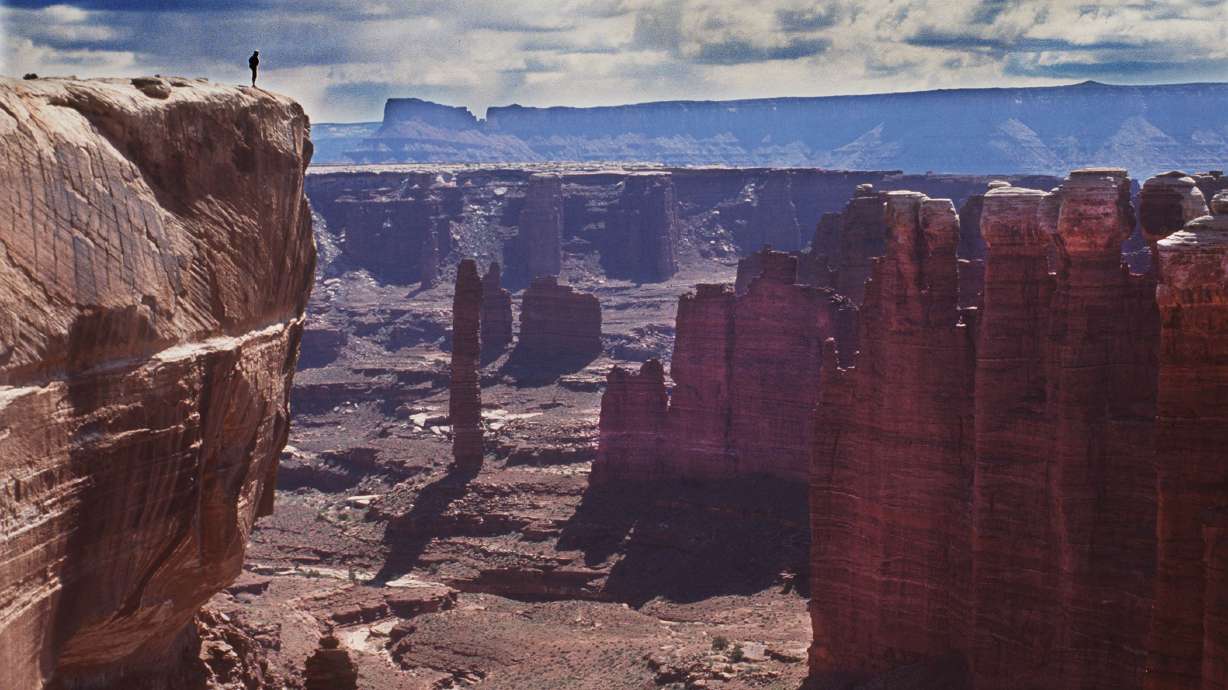Estimated read time: 4-5 minutes
This archived news story is available only for your personal, non-commercial use. Information in the story may be outdated or superseded by additional information. Reading or replaying the story in its archived form does not constitute a republication of the story.
SALT LAKE CITY — A new report issued Thursday by the Southern Utah Wilderness Alliance says passing America's Red Rock Wilderness Act, which would protect millions more acres of land in Utah, could help mitigate the impacts of climate change and stem the loss of animal species and biodiversity.
Passing the act would be a big step toward meeting the goals of the 30x30 Campaign to Save Nature, the report says, which aims to protect 30% of the earth's lands and oceans by 2030 in an effort to limit the planet's temperature increase.
In a Thursday presentation from the Wilderness Alliance, the Natural Resources Defense Council and the Sierra Club, SUWA board member Regina Lopez-Whiteskunk said America's Red Rock Wilderness Act "presents an extraordinary opportunity."
But not everyone sees it that way.
The plan is vastly more ambitious than even the expansion of the Bears Ears and Grand Staircase-Escalante national monuments, which Utah's Republican leadership uniformly opposes. The lands included are concentrated in southeastern Utah, but some are also in the Uintah Basin and in Utah's western desert as far north as Box Elder County.
Republican Rep. John Curtis is perhaps the most outspoken member of Utah's congressional delegation when it comes to tackling climate change. But he told KSL.com in a statement that America's Red Rock Wilderness Act "is not supported by any of the communities it impacts because it would reduce Americans' access to public lands and make no measurable impact on reducing the rate of our changing climate."
"Instead, Congress should focus on bipartisan proposals to reduce emissions, mitigate the impacts of climate change, and support locally driven consensus solutions to problems facing our public lands," Curtis said.
Rep. Chris Stewart, R-Utah, similarly condemned the plan in a written statement, saying that wilderness designations "will not impact climate or biodiversity."
"Claims that creating more Wilderness will combat climate change and protect biodiversity are misleading and disingenuous," Stewart said. "All public land is protected by the Endangered Species Act, Clean Air Act, Clean Water Act, and the laws that govern the various public land management agencies — all of which require protection of natural resources. Real solutions do not come from misleading the public about the role of wilderness. Real solutions come from consensus building on the local level."
The plan
America's Red Rock Wilderness Act, spearheaded by Sen. Dick Durbin, D-Ill., would protect about 9 million acres in Utah as federally designated wilderness. A 2020 analysis by environmental nonprofit EcoAdapt found the designations could reduce greenhouse gas emissions and increase carbon sequestration — removing carbon from the atmosphere via storage in plants and soils.
That combination would help fight climate change by "keeping fossil fuels in the ground," the report says. And while most people think of rainforests as the world's most effective carbon-removers, "dryland ecosystems also make a significant contribution."
According to the report, scientists estimate that the lands contained in America's Red Rock Wilderness Act currently sequester and store 241 million metric tons of organic carbon in plants and soils. The goal is to keep Earth's temperature from rising more than 2 degrees Celsius.
"To prevent our emissions from going over budget, permanently protecting an area as large as the Red Rock Wilderness will put us on the right path," said Carly Ferro of the Utah Sierra Club. "Protecting this area would make certain that greenhouse gasses remain stored and not released into the atmosphere."
In addition to the climate change component, SUWA says the act would preserve "five key wildlife corridors that are essential to biodiversity, not only in Utah but in ecosystems all along the continental Western Wildway."
The Western Wildway is a corridor of connected animal habitat that extends from northern Mexico through America's Intermountain West and into Canada.
Sharon Buccino, senior director of the Natural Resources Defense Council's land division, said lands currently protected along the Western Wildway are "fragments" that are "simply not large enough to sustain a healthy diversity of species and habitats."
"Passing America's Red Rock Wilderness Act helps to address this problem by connecting ecosystems and sustaining the lifelines for wildlife that stretch between them," she said. "Such connectivity isn't just important for wildlife; it's critical for humans."
When asked about the opposition of the Utah congressional delegation, Buccino said Congress is consistently "able to come together" to pass legislation like the 2019 public lands bill that created 1.3 million acres of new wilderness. "Sometimes it doesn't have all the support of the members of the Utah delegation," she said, but there is "diverse and wide support across the country for that."
President Joe Biden has already moved to reexamine the boundaries of the Bears Ears and Grand Staircase-Escalante monuments. But while SUWA and other environmental groups would love to see Congress go further, designating the Red Rock Wilderness may be a much heavier lift. After all, the legislation has been alive in some form since 1989 and has yet to come to fruition.









